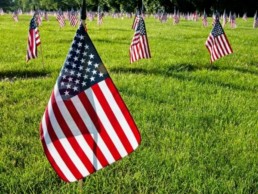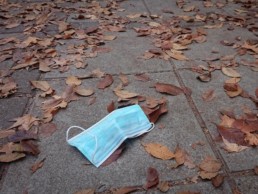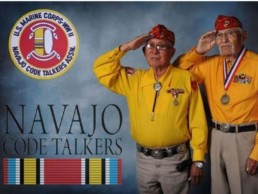The Honor of a Warrior – Staff Sgt. Edward Allen Carter, Jr.
Edward Allen Carter, Jr.
1916 – 1963
As Black History Month comes to an end, the Purple Heart Foundation honors the exemplary heroism, unmatched determination and commendable bravery of a young African American soldier. His actions were profound for a soldier of any race, religion, gender or creed but to happen during a time of segregation and discrimination, they are especially praiseworthy.
Lets begin at the beginning….Edward Allen Carter, Jr. was born on May 26, 1916, in Los Angeles California, but was raised in Shanghai, China. Carter knew he was destined to join the military from a young age. He attended military grade-school in Shanghai and studied languages until he became fluent in Hindi (his mother’s native tongue), Mandarin (the language of Shanghai), as well as English and German which he would later use in his military career. He began that career at the young age of 15, enlisting in the Chinese Nationalist Army. He rose to the rank of lieutenant before it was uncovered that he was underage and was discharged.
Once he turned 18, Carter attempted to join the U.S. Army but was not accepted due to discrimination. So Carter remained in Europe in the late 1930s, fighting for the Loyalists in the Spanish Civil War. He fought as a Corporal in the Lincoln Brigade until they were forced to flee to Paris in 1938. Upon his return to the United States in 1941, Carter once again attempted to join the U.S. Army and was finally accepted. He was quickly promoted to staff sergeant because of his extensive military experience.
During training in the segregated state of Georgia, Carter witnessed violence and discrimination upon African American soldiers. Many of whom were dishonorably discharged when they fought back. In order to remain in the military, Carter accepted multiple demotions in an era when African Americans were rarely allowed to be officers or even participate in combat. Racism proved to be a hindrance in Carter’s journey to follow his destiny. He volunteered to go into combat but was denied because at the time, African Americans were considered unsuitable for battle.
In 1945 however, replacements were desperately needed, so Carter once again gave up his staff sergeant stripes to volunteer as a Private and was assigned to the 56th Armored Infantry Battalion of the 12th Armored Division. Company commander, Captain Floyd Vanderhoff, recognized Carter for his experience and leadership by restoring his staff sergeant stripes and making him an infantry squad leader.
While fighting with the 12th Armored, Carter became a member of General Patton’s “Mystery Division”. He served as Patton’s personal bodyguard in the push into Germany where his actions in battle earned him a recommendation for the Medal of Honor, the highest award for valor, on March 23, 1945. Carter received the Combat Action Ribbon, the Purple Heart for the wounds he sustained in action, but due to his race he was awarded the Distinguished Service Cross, the country’s second highest military honor, instead of the Medal of Honor.
After the war, Carter was promoted to sergeant first class, but his enlistment was near expiration. During this time the Red Scare was in full effect, and therefore Carter’s request for re-enlistment had been denied due to fear that he may have communist ties from his exposure in China. He received an honorable discharge in October 1949 and lived out the remainder of his life as a family man until he passed away on January 30, 1963 at the age of 46.
Three decades later, a commission was assigned to identify unrecognized African-American heroes from World War II. Ten men were cited to receive the Medal of Honor. Edward Allen Carter Jr. was identified and recommended for honors for his actions fifty-two years after voluntarily leading a three-man group across an open battlefield. Edward Allen Carter, III received the Medal of Honor on behalf of his grandfather from President Bill Clinton on January 13, 1997. His citation read…
“For extraordinary heroism in action on 23 March 1945, near Speyer, Germany. When the tank on which he was riding received heavy bazooka and small arms fire, Sergeant Carter voluntarily attempted to lead a three-man group across an open field. Within a short time, two of his men were killed and the third seriously wounded. Continuing alone, he was wounded five times and finally forced to take cover. As eight enemy riflemen attempted to capture him, Sergeant Carter killed six of them and captured the remaining two. He then crossed the field using as a shield his two prisoners from which he obtained valuable information concerning the disposition of enemy troops, in their native tongue. Staff Sergeant Carter’s extraordinary heroism was an inspiration to the officers and men of the Seventh Army Infantry Company Number 1 (Provisional) and exemplify the highest traditions of the Armed Forces.”
Against all odds, Edward Allen Catrer, Jr. fought for what was right and followed his destiny. The Purple Heart Foundation Salutes Staff Sgt. Edward Allen Carter, Jr. for service and sacrifice. This Black History Month join us in honoring all service men and women who bravely follow their destiny in the eyes of discrimination and adversity.
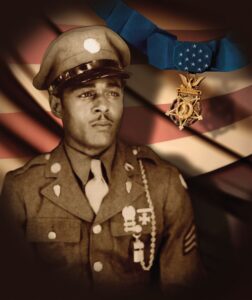
COVID-19: Affecting America’s Veteran Population
At the Purple Heart Foundation, we have been monitoring the spread of COVID-19 just like all of you. As you may know, the World Health Organization (WHO) recognizes the spread of the coronavirus as a “Pandemic”; a situation nobody was prepared for. And now the coronavirus has officially hit home… all 50 states have verified cases of the coronavirus. However, this country was founded on the characteristics of bravery, courage and strength… so this too, we shall overcome.
Although everyone is at risk, the most vulnerable are those with underlying health conditions and those over 50 years old, including a community of over 13 Million military veterans across the country. We fear for the safety and health of our nation’s veterans during this pandemic.
So as our nation endures the trials and tribulations of this critical time, we urge you to remain a united front. Everyone is at risk, so be do your part.
As you prepare for social distancing and potential quarantine, we ask that you don’t forget about your family, your community, those less fortunate, and the veterans that fought for our freedom.
This is the time for you to step up. Reach out to the veterans in your family or community and be the hero in their lives.
The coronavirus is highly transmittable and must be taken seriously.
However, while the rest of the world is telling you to wash your hands and don’t touch your face (which is medically sound advice and we agree), we want you to remind you of the following as you prepare for self-quarantine during the spread of COVID-19:
- Adults +50yrs, with underlying health conditions are at high risk.
- Call and check on older adults and veterans.
- Don’t Panic. We can get through this together.
- Those at high risk may need assistance getting food, medicine and other supplies. Be there for others, or if you need help, ask for it.
- Offer to be a veteran’s emergency contact to give advice, help contact family, or call for emergency services, if needed. Offer to be a lifeline.
At the Purple Heart Foundation, we believe that right now the safety and well-being of veterans is of the utmost importance. To learn more about how to give veterans a fighting chance against COVID-19, visit:
www.purplehear2dev.wpengine.com/resources.
Spreading Holiday Love
The spirit of giving brings us together, whether it’s giving Christmas presents under the tree or giving back in your community.
In an effort to spread holiday cheer, Purple Heart Foundation staff volunteered on Saturday, December 21, 2019 to serve a holiday meal and distribute care packages to homeless veterans at the Department of Veteran Affairs Community Resource & Referral Center, in Washington D.C., driven by the sole purpose, “to holistically enhance the quality of life of all veterans.”
It hurt to see the necessity in our own community; just think how many more homeless veterans are out there? As passionate employees of the Purple Heart Foundation that work hard to help as many veterans as possible, thoughts like this hit close to home. Our heroes deserve the very best after everything they’ve sacrificed.
Here’s what our volunteers said about their humble service on Saturday:
“It was a very positive experience. It felt really good to give back to those veterans who served” – Mitchell Theis
“The VA staff members had wonderful holiday spirit and I look forward to doing more volunteer work next year.” – Berhanu Adamu
The Purple Heart Foundation’s Marketing Manager, Amelia Kakar, said “It was very fulfilling to see all the veterans savoring the holiday meal we served, and to see their smiles as they opened our care packages. I’m also very proud of our staff who volunteered on a weekend to not only serve a holiday meal and distribute care packages but to bring hope, kindness and joy to homeless veterans who may not have been able to celebrate Christmas with family and friends this year. The experience was inspiring. My goal, as we move into a new decade, is to coordinate more experiences like this for our staff and corporate partners all over the country to work directly with their local veterans too.”
Purple Heart Foundation employee, Bianca Meruvia, has been volunteering since childhood with her mother, Luisa Meruvia, who also volunteered Saturday. Bianca said she chose a non-profit career path because “helping those in need fills my heart with joy. At one point in life I was in their position and I’m not ashamed because it made me the person I am today. I’m truly grateful for every little thing in life and everyone in it because when I needed help someone was there for me. I want them to know that I will be there for them and they’re not alone… especially at this time, which tends to be the hardest. It made me so happy to see the smiles on their faces.”
The staff enjoyed their experience giving back. Hands-on experiences such as this can be life changing for both the giver and receiver. Your support of the Purple Heart Foundation as we transition into 2020 will allow us to continue creating life changing experiences for our nation’s heroes. Donate by 11:59pm on New Years Eve USING THIS LINK, and our partners at Nexen Tire will double your donation!
Whiskey With A Cause: The Glenlivet 14 Year Old
The Purple Heart Foundation is solely dedicated to serving our nation’s heroes and The Glenlivet has joined our cause!
The Glenlivet is commemorating Purple Heart Month by partnering with the Purple Heart Foundation to introduce the brand new 14-Year-Old single malt scotch whiskey, in honor of our heroes. You still have time to buy a bottle of this newly crafted sing malt scotch whisky. Every purchase benefits the Purple Heart Foundation! For every bottle of The Glenlivet 14-Year-Old sold at participating retailers from July 1 to December 31, 2019, The Glenlivet will donate $1 to the Purple Heart Foundation, with a minimum guaranteed donation of $50,000, up to $100,000! The Glenlivet’s generosity will help the Purple Heart Foundation enhance the quality of life for thousands of veterans and their families across the country.
We invite you to buy a bottle of The Glenlivet 14-Year-Old and raise your glass in honor of all our heroes. Your purchase or donation will make a difference, and it will help us fund resources and programs that are so desperately needed by our veterans today. Anyone (over 21) can still honor a Purple Heart recipient this Purple Heart Month by purchasing a bottle of The Glenlivet 14-Year-Old from your local participating retailer this August!
To read more about The Glenlivet in the official press release, please click HERE.
To buy a bottle of The Glenlivet 14 Year Old, please click HERE.
To DONATE to the Purple Heart Foundation, please click HERE.

Help last “Navajo Code Talkers” This Memorial Day!
After the recent passing of 97 year old Navajo Code Talker, Fleming Begaye Sr., the Navajo Nation will be doing something special to honor the service and sacrifice of their veteran community.
This Memorial Day the Navajo Nation in Rock Point, Arizona will be hosting a Memorial Day Celebration to honor more than 74 veterans, multiple Purple Heart recipients, 2 Gold Star Moms and the last 2 remaining Navajo Code Talkers from World War II, Peter MacDonald and Thomas Begay!
This Navajo community is a small and humble group of Native Americans that live on reservation, so they have partnered with the Purple Heart Desert Thrift Shop in Mesa, Arizona to collect donations until May 24th. 100% of ALL cash donations in store or donations online will benefit the Navajo veterans and their Memorial Day Celebration!
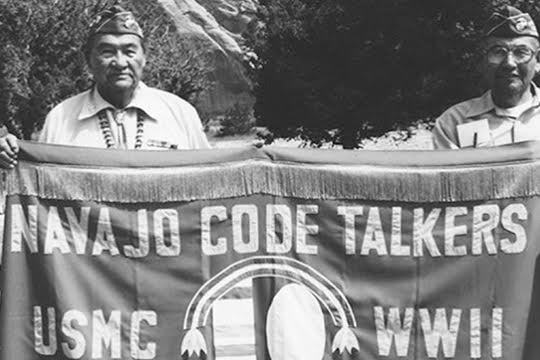
The Navajo Code Talkers have a unique history and are an infamous group of veterans that were recruited by the United States Marine Corps to use their native Navajo language to help maintain communication secrecy during the World War II. After the Navajo Code was developed, the Marine Corps established a Code Talking School where over 400 Navajos (Dine) were recruited as Code Talkers throughout World War II. The Japanese were never able to break these codes, that is why the Navajo Code Talkers are legendary – after WWII they were credited with helping the United States secure the Allied victory in the Pacific.
Navajo Nation President Jonathan Nez and Vice President Myron Lizer offered their heartfelt condolences to the family and loved ones of Navajo Code Talker Fleming Begaye, Sr., who passed away on Friday at the age of 97 in Chinle, Arizona.
“The Navajo Nation has lost another brave and selfless Diné warrior, who sacrificed more than we’ll ever know to defend our country,” said President Nez. “We offer our heartfelt appreciation to the family for sharing his life with us. May the Creator bless you and your family with strength and comfort.”
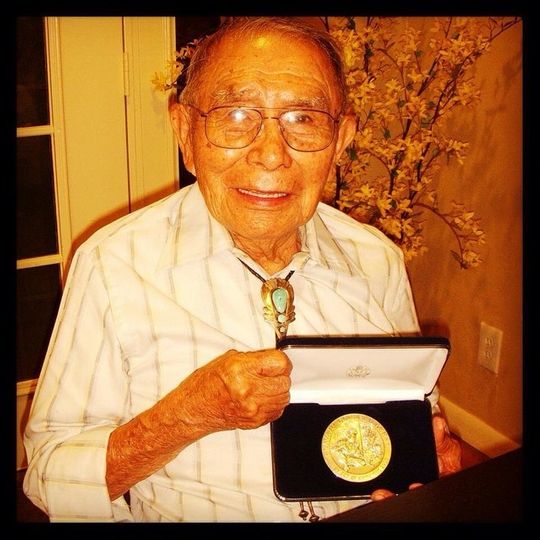
Navajo Code Talker Begaye is Tódích’íi’nii (Bitter Water Clan) and born for Kinłichii’nii (Red House People Clan). He was born on Aug. 26, 1921 in the community of Red Valley, Arizona and resided in Chinle, Arizona at the time of his passing. Begaye served as a Navajo Code Talker in the Marine Corps from 1943 to 1945 and fought in the Battle of Tarawa and the Battle of Tinian. He later spent one year in a naval hospital as a result of injuries and wounds he received during his service.
Following his military service, Begaye returned to the Navajo Nation where he owned and operated “Begaye’s Corner” trading post in the community of Chinle, where he also lived with his wife and three children.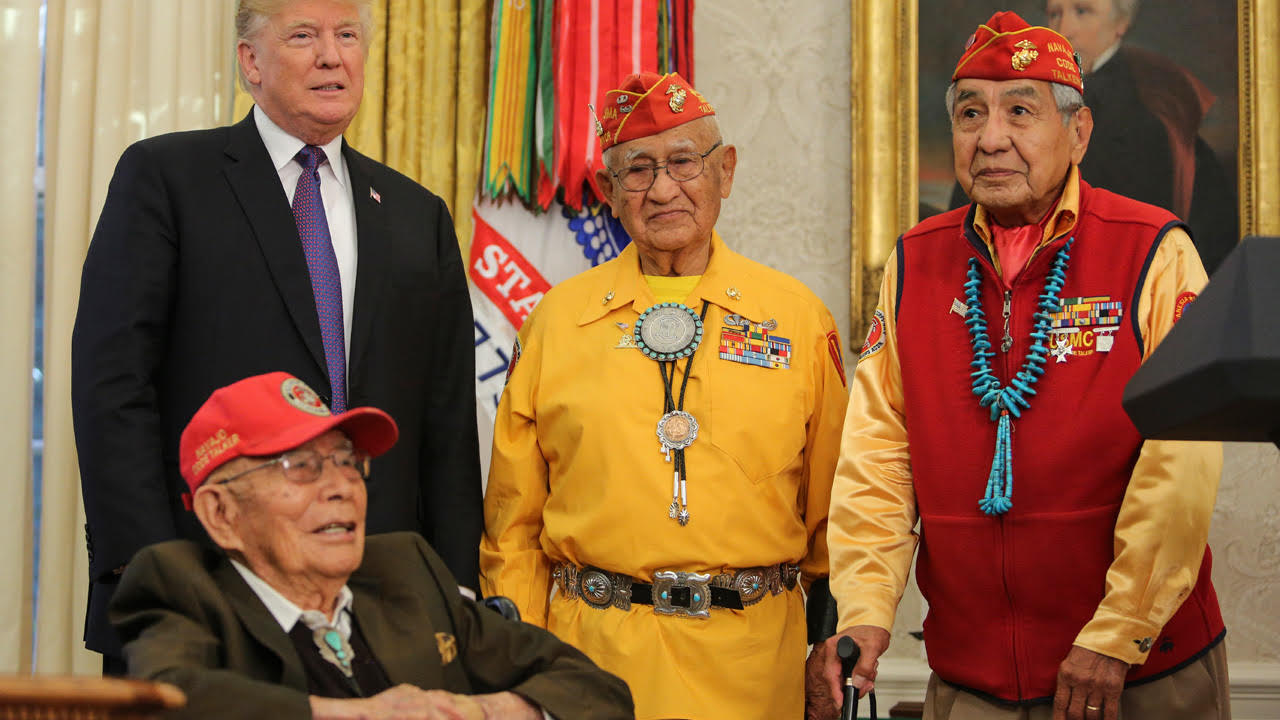
“Code Talker Begaye was a warrior, a family man, and a businessman. In every aspect of his life, he was a loving person who cared greatly for his people. Today, I ask our Diné people to keep his spirit and his family in your prayers as we give thanks for his life and his legacy,” said Vice President Lizer.
Funeral services and arrangements for Navajo Code Talker Fleming Begaye, Sr. are pending.
You can help the Navajo Nation honor Mr. Begaye’s heroic comrades, the last remaining Navajo Code Talkers, Peter MacDonald and Thomas Begay, as well as recognize dozens of other distinguished Navajo veterans and their families living on the Navajo reservation in Arizona….
Make a donation to the Navajo Nation Memorial Day Celebration at Purple Heart Desert Thrift!
100% of your donation will benefit the Navajo veterans and your donation is 100% tax-deductible! Help us honor their service and sacrifice!
Mesothelioma Awareness Day: How This Disease Continues to Impact Veterans
Every 26th of September, Mesothelioma Awareness Day (MAD) is recognized as a day to spread information about this rare disease and educate people about the dangers of its only known cause, asbestos exposure. Of the nearly 3,000 Americans diagnosed with mesothelioma each year, 30 percent of this total are veterans. It is important that we acknowledge the veteran population affected by this disease and continue efforts towards finding a cure.
What is Mesothelioma?
Mesothelioma is a form of cancer that primarily affects the lining of the lungs, but can also be present in the lining of the abdomen and heart. Due to its prolonged latency period, symptoms of this disease typically do not arise for nearly 10 to 50 years. When symptoms do begin to appear, oftentimes, the disease has already progressed to an advanced stage, making treatment options extremely limited.
Historically, the cause of mesothelioma cancer has been linked to asbestos exposure. Asbestos is a naturally occurring mineral that was often used in materials prone to heat and friction. When asbestos is disturbed, airborne fibers have the ability to be inhaled or ingested, gaining access to our internal organs. These fibers lay dormant within our bodies where they cause inflammation and scarring, leading to the development of tumors.
For those diagnosed with mesothelioma, the prognosis is most often very poor. Patients who are diagnosed at an earlier stage are given between 16 to 21 months to live post-diagnosis, which is a limited amount of time to pursue treatment.
How Are Veterans Affected?
Service men and women of our military are susceptible to asbestos exposure as a result of mass historic use of asbestos-products. While there has been a decline in asbestos usage and stricter regulations, asbestos may still be present on military bases, naval ships, and aircraft equipment. Because of this, there is a steady diagnosis rate amongst veterans. This will remain unchanged until asbestos is completely banned in the United States or the government issues a mandate for all asbestos to be removed from military locations.
Those who have served our country between 1920 to 1980 are at the highest risk of developing an asbestos-related disease, as this was the height of asbestos usage. Locations such as the sleeping barracks of ships used in the Navy were tight and limited, allowing for a high concentration of fibers to be present if asbestos was disturbed. Other branches that are affected by asbestos include the Air Force, Army, Coast Guard and Marines through asbestos materials used in things such as aircraft braking systems, military vehicles, and fireproofing for ships.
An additional risk factor that should be kept in mind is the use of asbestos in other countries. Members of our military can also be exposed while on deployment and stationed in areas that are war-torn, and as a result, have created large amounts of debris and rubble.
Across borders, many older buildings and homes on United States bases could be harboring asbestos-containing materials, such as roofing and flooring tiles. While it is difficult to avoid exposure because asbestos fibers are invisible to the naked eye, with the right protective equipment and knowledge, we can work to keep our military safe from these asbestos-related diseases.
Symptoms & Detection
Veterans that believe they may have been exposed to asbestos should receive checkups frequently and monitor their health closely. Symptoms of mesothelioma often mimic those of other less serious illnesses and should be evaluated no matter how seemingly minor. Some of the symptoms are as follows:
- Abdominal swelling
- Breathing difficulties
- Muscle Weakness
- Chest pain
- Coughing
Testing such as X-rays and CT scans can provide insight into underlying symptoms and help identify any abnormalities. Blood tests should also be performed regularly to see if there is an overabundance of mesothelin present in the blood, which may hint at malignancy. It is vital to monitor symptoms immediately. This will allow for the best chance of survival and successful treatment if the disease is caught early.
What to do if You’re Diagnosed
If you are diagnosed with mesothelioma, the next step is to understand your treatment options. It is important to research and connect with an oncologist that specializes in mesothelioma cancer, as they will be able to provide you with the latest and most effective treatments specific to your diagnosis. Cancer treatment costs can oftentimes be burdensome to families, and when diagnosed with mesothelioma, there is typically a party that is liable for the disease that you have developed. To manage these costs better, it is your right to seek legal action, as there are victim compensation funds set in place to ensure those who are affected by asbestos exposure receive the funding they deserve for their treatment.
How You Can Help
Mesothelioma is one of the lesser-known forms of cancer, receiving minimal coverage in mainstream oncology. With the support of others and by spreading awareness, this cancer will not only be diagnosed less, but a cure could be on the horizon. Through donating to the Purple Heart Foundation, the MOPH National Service Officer program will continue to help veterans fight for their VA benefits and receive much-needed care for injuries and illnesses, such as mesothelioma, that stem from service to our country.

